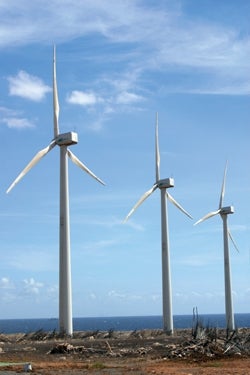The Wind Energy Siting Reform Act of 2009, which was drafted by Gov. Deval Patrick as a solution to the lengthy permitting delays that often accompany wind energy projects in Massachusetts, could go before the state Senate in 2010. But for some wind energy developers here in Central Massachusetts, the promise of a speedy permitting process is not without its problems.
Currently, because each of the 351 municipalities in Massachusetts has its own zoning laws and jurisdiction, wind energy proposals must get a number of local permits before any development can begin. Under the proposed legislation, the Massachusetts Energy Facility Siting Board would establish siting standards that cover all cities and towns, and for wind energy projects greater than two megawatts, a single, all-encompassing state permit would replace the series of local permits previously required.
Municipalities would still have the option of rejecting a project, at which point the project’s proponents would have to take the case to the state’s highest court.
Streamline Process
The aim of the legislation is to reduce the permitting time to a more manageable nine to 18 months (with no appeal), compared to some current delays that have lingered for as long as five, eight or 10 years.
But some wind advocates fear that eliminating the local permitting procedures will kill the impact and local support of a wind energy project.
“As you go for these permits, you educate people also,” said Sean Hamilton, general manager of the Templeton Municipal Water & Light Plant, which installed a 1.65 MW wind turbine behind the Narragansett Regional Middle-High School in Templeton earlier this year. “If we keep putting up wind turbines but don’t educate people, it’s defeating the purpose. When you educate the board in the town and others, you get acceptance by the people.”
Hamilton would not be opposed to an expedited permitting process, so long as the new legislation also mandated a set number of local meetings or public hearings to educate the communities about the project, its benefits, and to answer any questions that people may have.
According to Katherine Garrahan, an attorney within Worcester-based Bowditch & Dewey’s renewable energy group, this new legislation would make Massachusetts a more appealing locale for wind energy projects and would put the state on an even playing field with neighboring states such as New Hampshire and Rhode Island.
“When you’re at the point where entities in Massachusetts are buying wind power from New Hampshire and Rhode Island, something’s off,” she said.
She also said that under current laws, only energy projects that exceed 100 MW are eligible for an expedited permitting process. The problem is, only fossil fuel-based projects are of that scale at this time, which she says is counteracting the state’s push for an emphasis on renewable, clean energy sources.
“If the goal is to increase renewable energy and have it be home-grown renewable energy, it [the proposed legislation] would be a big help in Massachusetts,” she said.

